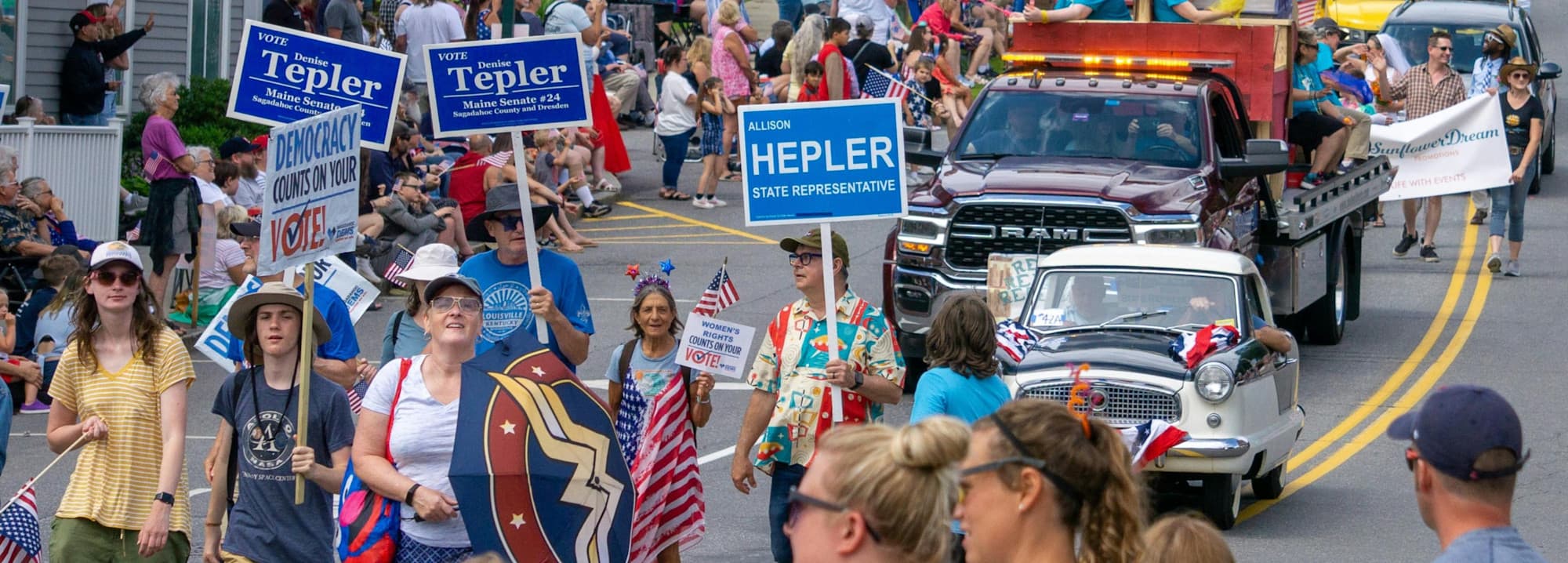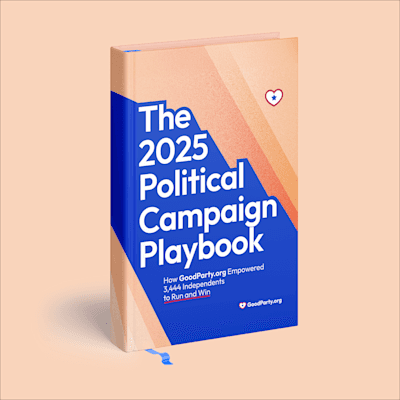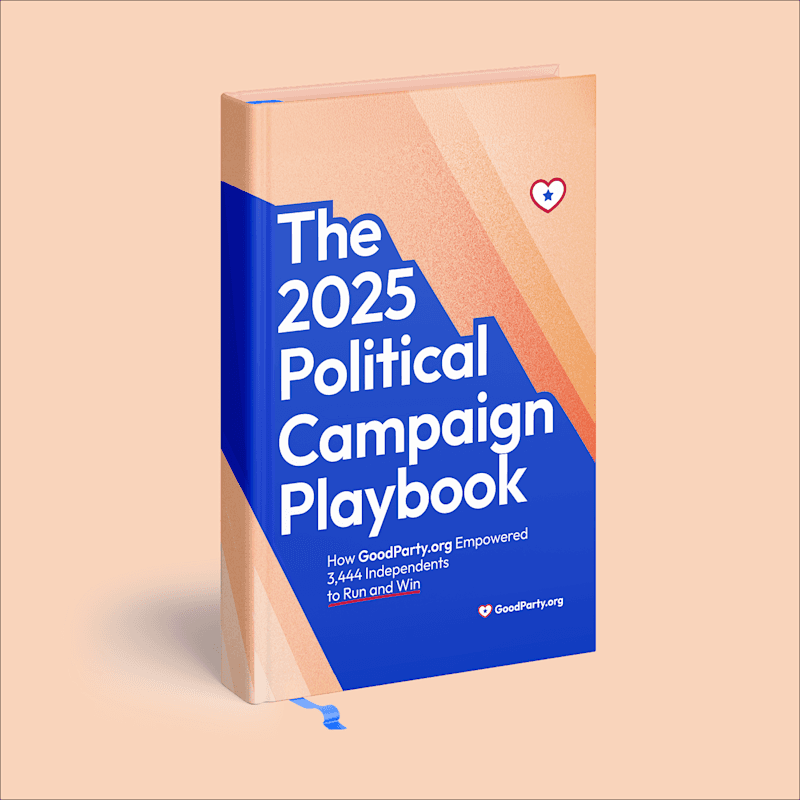
How to Run a Political Campaign in 2026
Running for office in 2026 is both exciting and challenging. As a midterm election year, 2026 will feature federal, state, and local races across the country. Millions of voters will head to the polls, but turnout patterns will look very different than those in presidential years. Especially for nonpartisan and Independent candidates, midterm turnout rates can create both opportunities and challenges.
In addition to many local elections throughout the year, 2026 has a general election on Tuesday, November 3. Thousands of offices are at stake, including all 435 U.S. House seats, 36 governors’ races, and countless local positions. 2026 is a pivotal moment.
This guide will walk you through how to run a political campaign in 2026, from understanding what’s on the ballot to filing deadlines, campaign strategy, and fundraising. Whether you’re running for school board, state legislature, or even Congress, these steps will help you build a people-powered campaign.
Running a Political Campaign in 2026: Step by Step
Before you start knocking on doors or posting on social media, you need a clear roadmap. Running for office means juggling deadlines, building a message, organizing supporters, and raising funds, all while staying rooted in your community.
Here are the steps every candidate should take in 2026 to launch and sustain a winning campaign:
Step #1: Understand the 2026 Election Landscape
In 2026, voters will elect leaders at every level of government:
Federal offices: 34 U.S. Senate seats and all 435 U.S. House seats will be on the ballot.
State offices: 36 governors’ races, plus more than 6,000 state legislative seats.
Local offices: Thousands of city councils, school boards, county commissions, and more.
2026 is a midterm election year, which means local campaigns don’t need to compete with a presidential race for attention. Additionally, the lower turnout typical of midterm years creates an opportunity that can amplify the power of grassroots campaigns and community-based organizing. The voters who do show up are often more motivated and engaged, giving grassroots campaigns an edge. If you can connect directly with your community, you’ll have a better chance of standing out from the noise of national politics.
Step #2: Know Your 2026 Filing Deadlines
Filing windows span from as early as October 2025 to as late as the end of August 2026. Generally speaking, for an election date in May 2026, you need to file between mid-January and the end of March 2026. November 2026 elections typically open for filings around the end of February, and the deadline to submit is around the end of August.
Here are a few examples for the November 3, 2026 election for Independent candidates:
New York: Candidates must file between May 19 and May 26, 2026.
Arizona: Candidates must file between March 7 and April 6, 2026.
Illinois: Candidates must file between May 18 and May 25, 2026.
Florida: Candidates running for federal offices, state attorney, or public defender must file between April 21 and April 25, 2026, but those running for other state offices must file between June 8 and June 12, 2026.
For local candidates, filing deadlines for seats like city council, school board, and county offices are set by your city or county election office. Deadlines for municipal-level offices may happen later than state-level deadlines, even just a few months or weeks before election day.
The requirements for filing also vary depending on your location, the level of office you’re running for, and if you’re affiliated with a political party. While many major-party candidates can get on the ballot through a primary election, Independents typically have a different process involving gathering signatures and filing paperwork with the state’s board of elections. (Learn how to collect signatures like a pro with our free course.)
Check with your local board of elections or city clerk for the exact filing timeline and requirements.
LEARN MORE: Use GoodParty.org’s election look-up tool to see what seats are open near you, filing deadlines, and how to run.
Step #3: Define Your Campaign Message
Your campaign message is the foundation of your run for office. It’s how voters understand what you stand for and why they should trust you with their vote.
A strong campaign message should be:
Rooted in your values
Focused on your community’s real needs
Clear and simple enough to repeat in one sentence
Memorable and easy for volunteers and supporters to share
Midterm voters tend to be more engaged and issue-focused, so keep your message rooted in the local concerns that affect your community every day.
Step #4: Build Your Campaign Team and Field Strategy
No one runs for office alone. Even the smallest campaigns need a core team and a plan to reach voters.
Key roles to consider include:
Campaign Manager: Keeps everything on track
Treasurer: Handles campaign finances and compliance
Volunteer Coordinator: Organizes and motivates your supporters
Because midterm turnout is lower than in presidential years, a well-organized ground game can carry even more weight. In some local races, a few hundred conversations at voters’ doors can make the difference between winning and losing.
LEARN MORE: Our pre-launch checklist can help you get everything together before announcing your campaign to your community.
Step #5: Fundraise the Smart Way
Money isn’t everything in politics, but you do need enough to get your message out.
In 2026, many donors will pour money into high-profile Senate and gubernatorial races. Independent and local candidates can stand out by cultivating small-dollar support from neighbors and community networks, showing voters they’re powered by people, not super PACs.
Independent and local candidates can compete by focusing on:
Grassroots donations from community members
Crowdfunding campaigns to amplify small-dollar support
Low-cost events like BBQs, coffee meetups, or town halls
Set a realistic budget for your race. The cost to run for office depends on what office you’re running for and where you live. For instance, a school board campaign may only need a few thousand dollars, while a state legislative race could require over $50,000, and any race in a major city will likely cost more than those in rural areas.
LEARN MORE: New to raising money? Check out our guide to political fundraising to learn everything you need to fund your campaign.
Step #6: Launch and Run Your Campaign
Once your message, team, and fundraising are in place, it’s time to launch. Successful campaigns in 2026 will blend digital outreach with on-the-ground community engagement.
You can do this by:
Using social media to share your story and connect with younger voters.
Building a texting and email program to reach supporters directly.
Hosting listening sessions and events to stay rooted in your community.
Keeping track of voter data to measure progress and adjust strategy.
Launching your campaign is a milestone, but the real work begins after launch. In a midterm year, every supporter you bring into the fold matters. With a smaller electorate, staying consistent, following up with voters, and tracking your progress will help you stay on course.
In the months ahead, focus on local issues. The personal connections you build with voters will be your strongest asset, so stay persistent, visible, and rooted in your community.
Why 2026 Is the Right Year to Run
Running for office is never easy, but 2026 offers a unique chance for new voices to break through. Midterms create more space for local campaigns to shine. Without a presidential contest at the top of the ticket, voters are often more willing to look closely at down-ballot candidates. That means Independents who run authentic, community-focused campaigns in 2026 will have a real chance to win.
Voters are looking for leaders outside the party system. Candidates who bring authenticity, community focus, and grassroots energy will have an advantage. In the 2022 midterms, turnout topped 46%, representing over 100 million voters. In 2026, every one of those votes is up for grabs.
If you’ve been waiting for the right moment to run, this is it.
At GoodParty.org, we’re here to empower you every step of the way. From ballot access support to digital tools and strategy, we provide the resources Independent candidates need to run, win, and serve their communities.
Photo by Matt Barnard
Ready to run your 2026 campaign? Book a demo to see how GoodParty.org is empowering Independent candidates across the country.

